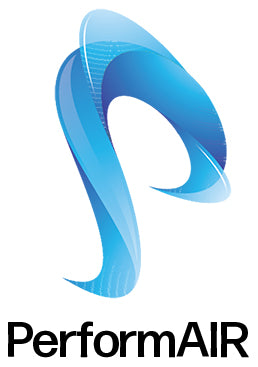Snoring
IF YOU CAN’T BREATHE THROUGH YOUR NOSE - YOU WILL BREATHE THROUGH YOUR MOUTHWhy this is not good. When we breathe, if we cannot get enough oxygen through our nose to get the oxygen levels needed for our blood, we automatically open our mouth and switch to mouth breathing. This is true when sleeping, during athletic activities or even when sitting at a computer. This is exactly why PerformAIR® Nasal Dilators were developed. When sleeping, if you switch to mouth breathing – you are likely to start snoring and create a condition called dry mouth. During athletic activities, mouth breathing increases water loss, results in decreased energy, and changes the athlete’s salivary production creating greater likelihood of heat stress and lower muscle performance – all of which negatively affect athletic performance due to dehydration. Even during work related functions if congestion, allergies, or other nasal blockages occur you can reduce your oxygen levels in the blood and when these drop sufficiently you may experience shortness of breath, headache, and confusion. Mental clarity requires deep breathing and oxygen in the blood – using PerformAIR® during sleep, work or athletic performance can provide better mental clarity. PerformAIR® provides a unique ergonomically designed dilator that wraps around the nasal airways in the nose – opening them up by expanding the outer wall of the nose outwardly and increasing the “pipe” you use to move air through your nose. Most competitive dilators are placed IN your airway effectively blocking your “pipe” – use PerformAIR ® to optimize your airflow. SLEEP BETTER | BREATHE BETTER | PERFORM BETTER
MOUTH BREATHING IS A PRIMARY CAUSE FOR SNORINGSource: Snore Lab Mouth breathing is a primary cause for snoring, nasal breathing not only lowers your snoring risk, but has other benefits too. Nasal breathing warms and humidifies incoming air, helping to prevent your airways drying out. It also channels air over your snoring noise-makers in a far less turbulent way than mouth breathing does.
NASAL BREATHING REDUCES SNORINGSource: Raj C. Dedhia, MD, MSCR, assistant professor, Otolaryngology/HNS & Sleep Medicine, at Emory University Hospital report: So how does nasal breathing relate to snoring? Dedhia says breathing through your nose is actually the optimal way to breathe during sleep. “Mouth breathing has a couple of problematic effects on the course of the airflow,” he says. “When you breathe through your mouth, your jaw tends to fall back, which causes your tongue to fall back, and even your palates are relaxed more. That combo makes it more likely for the patient to have an obstruction. When the airflow goes through the mouth and hits that back wall, there isn’t a smooth transition like there is in the back of the nose. So there’s more turbulence that can generate snoring sounds.”
BREATH BETTER | SLEEP BETTER | PERFORM BETTERWhen using PerformAIR® Nasal Dilators:
|

 USD
USD EUR
EUR

